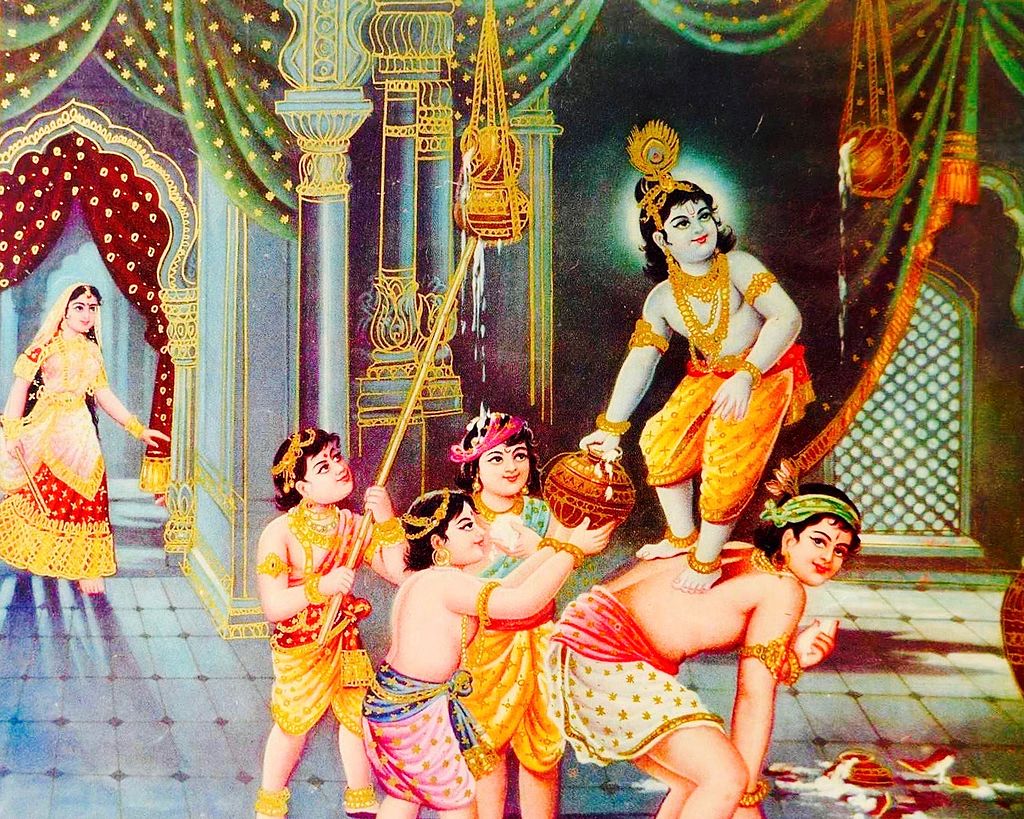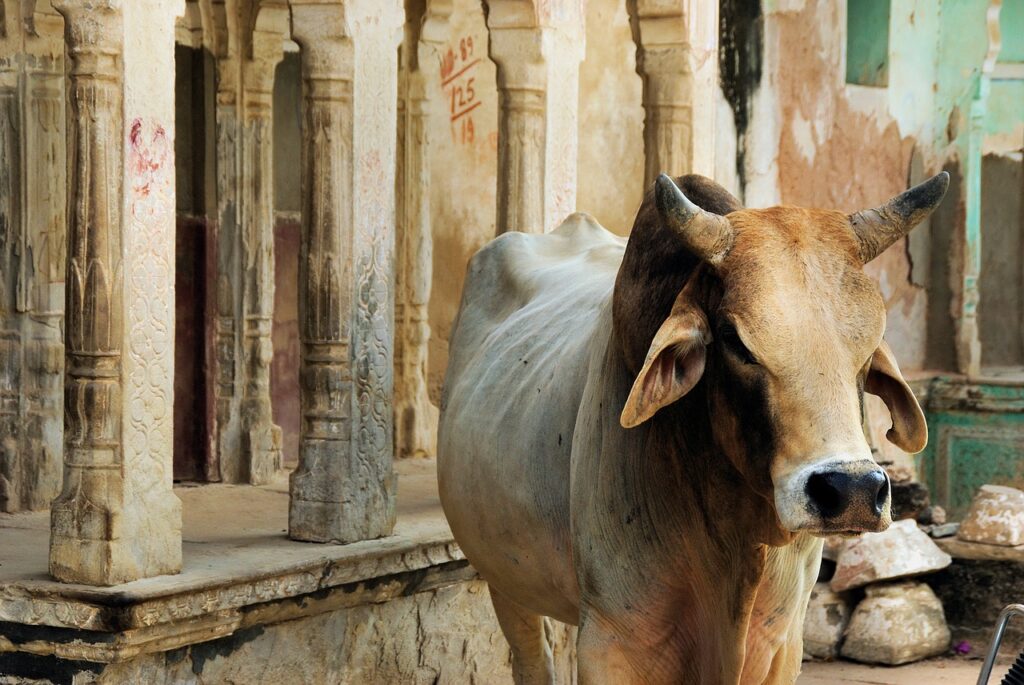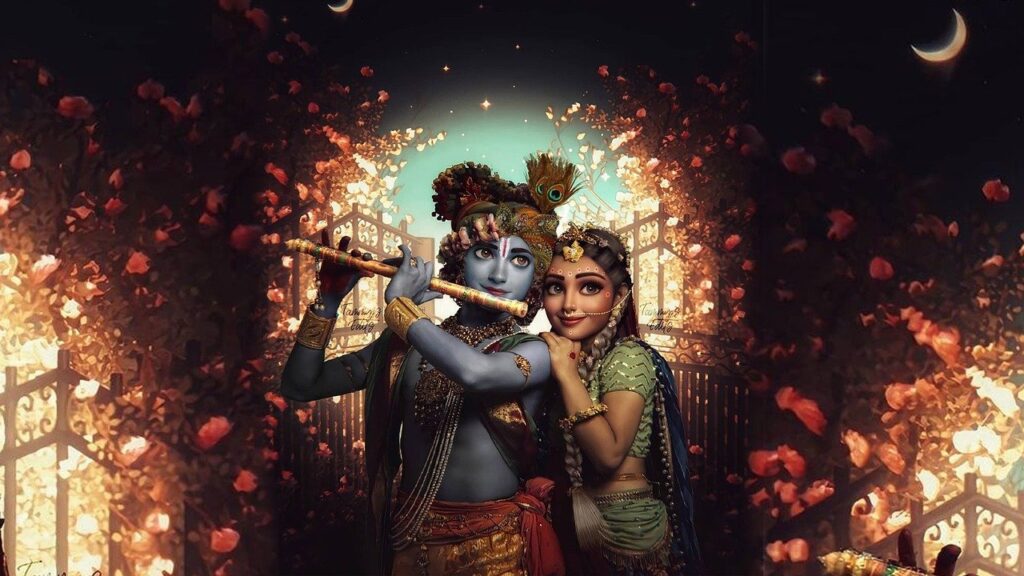
Namo brahmanya devaya
Go brahmana hitaya ca
Jagad dhitaya Krsnaya
Govindaya namo namah
(Vishnu Purana 1.19.65)
–
I offer my obeisances again and again to Lord Krishna, who is always worshiped by qualified brahmanas and is very dear to them. He is always concerned with the welfare of the cows, the brahmanas, and the whole world. I offer my repeated obeisances unto the Personality of Godhead, known as Krishna and Govinda.
The above mantra, quoted in Vishnu Purana, is used to worship and offer bhoga to Lord Krishna. The above prayer lays a striking emphasis on the protection of cows and the brahmanas. Brahmanas, or the intellectuals, are the symbols of spiritual education. In Vedic India, cows were treated as mothers and they sustained the entire society with their milk. From the above verse, it is abundantly clear that cows were very dear to Krishna. In fact, the Bhagavad Gita quotes Lord Krishna in saying –
ayudhanam aham vajram
dhenunam asmi kamadhuk
prajanas casmi kandarpah
sarpanam asmi vasukih
(Bhagavad Gita 10.28)
–
Of weapons, I am the thunderbolt; among cows, I am Surabhi, the provider of plentiful milk. Of procreators, I am Kandarpa, the god of love, and of serpents, I am Vasuki, the chief.

Surabhi or Kamadhenu is a divine cow who is considered to be the mother of all the cows of this world. Surabhi is a ‘cow of plenty’ who could provide her owner with whatever he wanted.
Cows are very dear to Krishna
Cows and Krishna have always been inseparable. In His original form in the spiritual world, Krishna is a cowherd boy in the agricultural community of Goloka (cow planet) Vrindavan, where he tends endless transcendental Surabhi cows. When Krishna descends to the earth, He carries a replica of spiritual Vrindavan with Him. Even in this world, He spends His childhood tending to cows and calves while playing in the pasturing grounds of Govardhan with His friends. Krishna knew every cow by its name. He shows by His example the importance of cows to human society, the practical benefits of caring for them, and the advantages of an agricultural economy based on cooperation between man and cows.

The Vedic society encouraged cow protection. Lord Krishna states in Bhagavad Gita how Vaishyas (mercantile community) should attend to their natural inclination to protect cows and sell products based on cow’s milk.
krsi go raksya vanijyam
vaisya karma svabhava jam
paricaryatmakam karma
sudrasyapi svabhava jam
(Bhagavad Gita 18.44)
–
Agriculture, cattle raising, and business are the qualities of work for the Vaisyas, and for the Sudras, there is labor and service to others.
In fact, the saintly Kings of ancient India were renowned for their love and protection of cows.
nijagrahaujasa virah
kalim digvijaye kvacit
nrpa-linga-dharam sudram
ghnantam go-mithunam pada
(Srimad Bhagavatam 1.16.4)
–
Once, when Maharaja Parikshit was on his way to defeat the world, he saw Kali Yuga personified. The person was lower than a shudra, disguised as a king and hurting the legs of a cow and bull. The King at once caught hold of him to hand in sufficient punishment.

One of the instructions Lord Krishna gives to Uddhava is that He can be worshiped by serving and feeding cows. Srimad Bhagavatam (11.11.43) states ‘gosv anga yavasadina’ – I (Krishna) can be worshiped within the cows by offering them grass, and other suitable grains or paraphernalia for the pleasure and the health of the cows.
Again in Srimad Bhagavatam (3.2.29), we come across the verse ‘sa eva go-dhanam laksmya niketam’. This verse implies that during the Vedic years, one was considered opulent relying upon his store of grains and cows. Cows and grains helped humanity solve its food crisis. It is said that cow milk is especially essential for developing the human acumen so that he can comprehend the intricacies of transcendental knowledge. The bull helps in agriculture and thereby produces grains, etc. Hence the bull, in one sense, is the father of humankind. On the other hand, the cow, who supplies milk to the entire society, was regarded as the mother.
The five products produced by cows namely milk, yogurt, clarified butter, cow dung and cow urine were used during all ritualistic ceremonies. These products were even required during the installation of the deity as indicated in the following verse from Srimad Bhagavatam (8.8.11) – ‘gavah pancha pavitrani’.
In fact, when Krishna was saved from the demon Putana, mother Yashoda, Rohini, and all the elderly ladies were very concerned. To protect Krishna from all future dangers, they waved about the switch of a cow. Waving the switch of a cow was considered auspicious and it was a common practice for the ladies to do the same during the ancient days to provide protection to their children. This is cited in the Srimad Bhagavatam (10.6.19) as follows – ‘raksam vidadhire samyag, go-pucchha bhramanadihih’.
Cow protection in the Vedas
Cows are very dear to Lord Krishna. During the Vedic era, cows were considered a part of one’s family. They were provided with care and protection. Instructions are found throughout the Vedas condemning those who harm cows. Sanskrit Names for cows that have been used widely in Vedic scriptures include : Go-mata (mother cow), Kamadhenu (Wish-fulfilling), and Aghnya (never to be killed).
For example the Manu Samhita (chapter 4, verse 162) states that – A guru, a teacher, a father, a mother, a brahmana, a cow and a yogi all should never be killed.

The Rig Veda (10.87.16) even goes as far as to say – “One who partakes of human flesh, the flesh of a horse or of another animal, and deprives others of milk by slaughtering cows, O King, if such a fiend does not desist by other means, then you should not hesitate to slay his head.”
As a matter of fact, the Vedic scriptures denounce the killing of any animal whatsoever for food. Below excerpts shall confirm this point –
“If he has a strong desire (for meat) he may make an animal of clarified butter or one of flour (and consume that); but let him never seek to kill an animal without a (lawful) reason. As many hairs as the slain beast has, so often indeed will he who killed it without a (lawful) reason suffer a violent death in future births.” (Manu-samhita 5.37-38)

“The sins generated by violence curtail the life of the perpetrator. Therefore, even those who are anxious for their own welfare should refrain from meat-eating.” (Mahabharata, Anu.115.33)
“He who buys flesh, kills living creatures through his money. He who eats flesh, kills living beings through his eating. He who binds or seizes and actually kills living creatures is the butcher. These are the three sorts of slaughter through each of these acts. He who does not himself eat flesh but approves of an act of slaughter, becomes stained with the sin of slaughter. (Mahabharata, Anu.115.38-39)
“Those who are ignorant of real dharma and, though wicked and haughty, account themselves virtuous, kill animals without any feeling of guilt or fear of punishment. Further, in their next lives, such sinful persons will be devoured by the same creatures they have killed in this world.” (Bhagavata Purana 11.5.14)